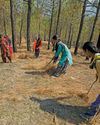
"Centralisation is a concern"
C PRAJENDRAN
ADJUNCT PROFESSOR, NATIONAL INSTITUTE OF ADVANCED STUDIES, BENGALURU
The Union Cabinet's approval for the National Research Foundation (NRF) Bill has been received with mixed feelings. Mostly modelled after the US' National Science Foundation, NRF has been discussed and developed since the time of the Manmohan Singh government. It has now been approved with an outlay of 50,000 crore for the next five years, more than half of which is expected to be contributed by the private sector. This is a meagre amount, given that India's funding for scientific research is already much less than other BRICS nations (Brazil, Russia, China and South Africa).
Besides, according to the Bill, the proposed entity will be administered by a governing body of "eminent" researchers and professionals, presided by the prime minister, and with an executive council chaired by the principal scientific advisor. This top-heavy management setup will likely lead to over-centralisation-as against the proclaimed intention of having a decentralised mechanism for science funding.
This cannot be overlooked in terms of the suspicion that a part of the fund is likely to be spent on belief-based traditional knowledge systems. There are also concerns about the criteria that would be used to select experts in the governing and executive bodies.
To unleash the full potential of Indian science and to improve the science-technology-innovation ecosystem, we require a vibrant and responsive financial system, which is autonomous, more participatory and less bureaucratic.
"First, close gaps in education"
ARINDAM GHOSH
PROFESSOR, DEPARTMENT OF PHYSICS, INDIAN INSTITUTE OF SCIENCE, BENGALURU
この記事は Down To Earth の August 01, 2023 版に掲載されています。
7 日間の Magzter GOLD 無料トライアルを開始して、何千もの厳選されたプレミアム ストーリー、9,000 以上の雑誌や新聞にアクセスしてください。
すでに購読者です ? サインイン
この記事は Down To Earth の August 01, 2023 版に掲載されています。
7 日間の Magzter GOLD 無料トライアルを開始して、何千もの厳選されたプレミアム ストーリー、9,000 以上の雑誌や新聞にアクセスしてください。
すでに購読者です? サインイン

THE CIRCULARITY ARGUMENT
A circular economy can help India achieve its developmental aspirations while following the low-carbon pathway. It will also help address the challenges of waste management, pollution and overexploitation of natural resources. Industries are already innovating to reuse high-volume wastes and have shown that the transition can usher in both environmental and financial windfalls

Banking on flawed drug voluntary licences
The Medicines Patent Pool is pushing for more VLs, but its bad deal with Novartis on a cancer drug shows the pitfalls

Lasting solutions
For the first time, the UN has recognised the role of indigenous communities in tackling aridity. A repository of traditional knowledge India has the wherewithal to lead the way

IMD at 150
India's journey into modern weather forecasting took a decisive turn 150 years ago with the establishment of India Meteorological Department during the British rule. The agency has come a long way since then, shaping the way the country predicts and responds to its diverse climate challenges

Every drop counts
In drought-prone Marathwada region, 14 villages have managed to counter water shortage by budgeting the resource

Threat to survival
Hollongapar Gibbon Sanctuary in Assam faces ecological challenges as railway electrification and hydrocarbon exploration endanger its fragile biodiversity

'Migration is going to be a battlefield'
AMITAV GHOSH is one of the foremost chroniclers of our times. His literary sojourn includes writings on topics that range from languages to climate change to human lives. His latest book, Wild Fictions, brings some of his works on these issues under one title. In a conversation with RAJAT GHAI, Ghosh shares his views on the future of human movement. Excerpts:

Face of future
California wildfires confirm forest fires are intensifying in a hotter world, emitting substantial amounts of greenhouse gases and reinforcing global warming

Friends of the forest
Residents of 30 villages in Uttarakhand establish a model for public participation in saving forests from wildfires

Climate-crazy playbook
Just hours after his second (and final) term began on January 20, US President Donald Trump unleashed 46 presidential actions. Several of these are centred on the US' climate commitments, energy transition, migration and trade policies, and are likely to have negative global implications